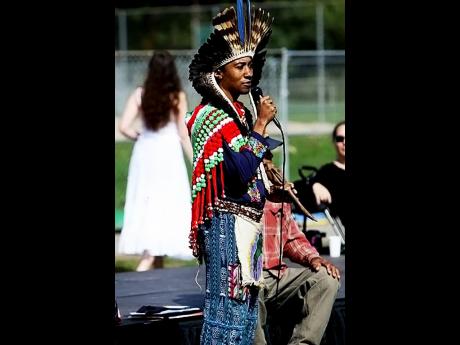‘Let the people decide’
Taino chief bats for referendum to determine path forward on nation’s final court
The group of Jamaicans who identify as Tainos says the issue of the country’s final court should be determined by citizens, arguing that a referendum is the ideal way to settle the more than decade-long contentious matter.
Robert Pairman, Kasike/Chief Kalaan at the Yamaye Guani Council identified as Jamaican Tainos, told The Gleaner yesterday that there is a divide within the group on whether the country must remain within the jurisdiction of the Privy Council or accede to the Caribbean Court of Justice.
Pairman said discussions are ongoing among the group, which is currently seeking Indigenous People status. He said they are yet to settle on a position.
“At present, there are responses on both sides, and they seem reasonable. So if we are having that issue in our community, I can just imagine what it’s going to take,” said Pairman, who was en route to the celebration of the Tainos’ new year in rural Jamaica.
“I believe what really needs to happen is that it really needs to be a decision made by the people of Jamaica. What the people agree on is what everyone should work with, so a referendum,” he said.
Issue could become politicised
However, arguments put forward by Dr Christopher Charles, professor of political and social psychology at the University of the West Indies, counter the position of the Tainos, who number around 3,000 on the island, and others.
According to Charles, that avenue is likely to be fraught with politics similar to what occurred during the run-up to Brexit, when British people voted for the United Kingdom to withdraw from the European Union (EU).
Charles noted that the decision on Jamaica’s final court can be made via Parliament as prescribed by the Constitution, or through a referendum, a position previously put forward by Prime Minister Andrew Holness.
“When the oppressors were coming here, the murderous British, when they came here and brought our ancestors in shackles in the most inhumane conditions from Africa and enslaved us for hundreds of years without remuneration, did they have a referendum?
“When they were robbing us, did they have a referendum? When they imposed themselves on us, did they have a referendum? No,” Charles asserted.
He said that those who are averse to the parliamentary route are of this mindset due to a pro-British and pro-Privy Council mentality.
He said once the decision goes to a referendum, the partisan core of political parties will be mobilised, and the issue then becomes politicised along party lines.
He said the governing Jamaica Labour Party is hoping that most Jamaicans will vote in favour of its position — similar to what occurred during the vote on the West Indies Federation when citizens decided to leave.
“They are hoping that the majority will vote to retain the Privy Council, but the Brexit situation in the UK is instructive,” said Charles.
He said the negatives of leaving the EU were not discussed by those who wanted to leave.
“We’re now seeing the financial cost, the impact on the British economy, and the travel woes of the British that they now need a visa to enter the rest of countries along with a host of other problems. It is because the Brexit issue was politicised and the issues were not heard in any fair way. There was a lot of misinformation, and we are now seeing the consequence of that for British society.
“It is the same thing here. If we put it to a referendum, it will be politicised, and there will be partisan positions, and there is a risk that the majority of Jamaicans may say retain the Privy Council,” the university lecturer said.
He said such a position may likely be influenced by some of the “big” cases brought to the appellate court in recent times, including the matter concerning dancehall artiste Adidjah ‘Vybz Kartel’ Palmer. The court ruled in the popular entertainer’s favour, and in other cases, overturned the ruling of lower courts.
Charles urged caution, noting that it is not clear what percentage of the number of cases brought to the Privy Council from Jamaica since 1962 or from other Commonwealth countries has been upheld.
“We don’t know. All we are using are the anecdotal cases. We can’t do that,” he said, adding that current public discourse sometimes confuses the issue.
Further, he questioned Jamaica’s retention of the Privy Council as the apex court while asserting independence and also cited the high cost for the average Jamaican to take a case to London.
He said it is in most cases financially out of reach, and in addition, the requirement for a British visa is foolish.
He said the CCJ is a less expensive alternative with a pool of judges from across the Caribbean who are more in tune with the cultural nuances and how institutions function.
Opposition Leader Mark Golding has said that the party will not support Jamaica’s removal of King Charles III as head of state without a departure from the Privy Council.
He said the decision on the final court should be made in Parliament.

